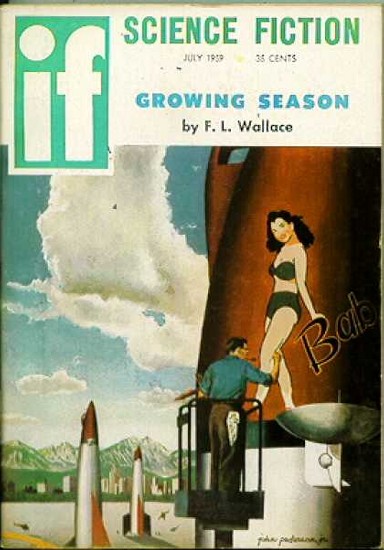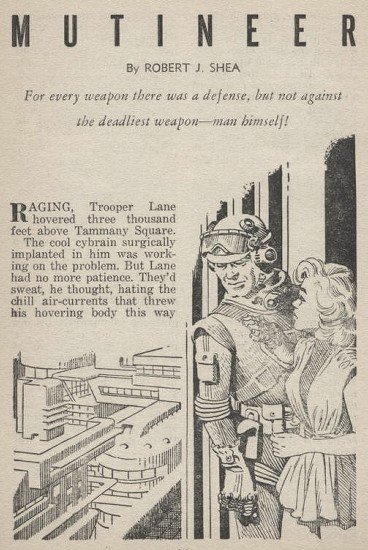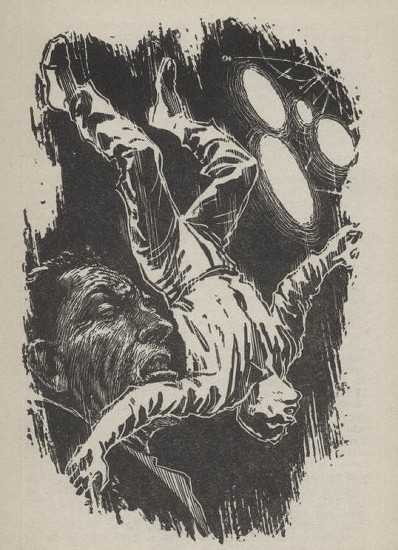It's been a topsy turvy month! Not only have I been to Japan, but I've just gone to yet another new science fiction convention taking place virtually next door (pictures appended below). Yet, despite all the bustle, I've managed to find time for my #1 pasttime: my monthly pile of science fiction/fantasy digests. And here, at long last, is my review of the September 1960 IF Science Fiction.

As Galaxy's lesser sister, its overall quality tends to be a little lower. There are a couple of stand-outs in this issue that made it a worthy purchase, however. Moreover, I'm noticing a trend toward the experimental. H. Gold (and his right-hand, Fred Pohl) seem more willing to take chances with this mag. I'm looking forward to seeing where this goes.
I don't want to spoil the stories for you, so I'll keep the synopses brief:
Daniel Galouye has the opening number, a longish novelette called Kangaroo Court. It's an interesting murder mystery in a world where telepathy has made crime obsolete. An extra twist is the development of memory copying–a technology that lets one create a full simulacrum of a person's personality up to the date of storage. I'm given to understand that a writer should only present one revolutionary technology per story, but I think Galouye pulls it off. Three stars.
Margaret St. Clair is also back with her short story, Parallel Beans, a cute little piece about the dangers of bartering across alternate time streams. Three stars.
Wedge, by H.B. Fyfe, is about a human prisoner who is the subject of an alien intelligence test. Is he the testee or the tester? The first weak piece of the issue: Two stars.
But it is followed up by To Choke an Ocean by the reliable J.F.Bone. I like stories without antagonists, and they get bonus points if they involve interesting alien civilizations. Four stars.
That brings us to Arthur Porges, who turned 45 yesterday (Happy Birthday!) His Words and Music, about a man who can tell a person's future in a decidedly off-beat (or perhaps "on-beat" is more appropriate) fashion, would make a fantastic episode of The Twilight Zone. Another four star tale.
There is a brief interlude during which Fred Pohl contributes a longish book-review column. It includes praise for the rather awful The Tomorrow People, by Judy Merril. It is followed by Robert Shea's unusually written, but rather pointless, Star Performer, involving a Martian aborigine and his effect on the decadent, overripe population of Earth. Two stars.
Finally, R.A. Lafferty offers up Six Fingers of Time, about a fellow who discovers a talent for living life at an accelerated rate. The writing is odd, and the subject matter uninspired, and yet…it has a certain charm. Three stars.

That puts us at exactly three stars for the issue no matter how you slice it, which ranks it above Astounding and below F&SF this month. No surprises there. F&SF also wins the prize for best story: George Elliott's The NRACP, though to be fair, it's a reprint. I might give the nod for best original story to Bone. Your mileage will almost assuredly vary.
Finally, of the 22 stories, serial portions, and non-fiction articles appearing in the three magazines, exactly two of them were written by women. I'll leave this datum here without further observation or opinion.
This weekend, I'm off to the movies to watch Dinosaurus, the new flick from the team that brought us The Blob and 4D-Man. Sadly, neither of the members of my immediate family will go with me. Perhaps I'll run into one of you, my beloved fans.
And for those who came here to see the pretty pictures, here are the costumes from our local science fiction convention:





And some attendees, not in costume:





Yes, that's the Traveller, himself (on the left).
That's all for today, and if you're one of the gracious attendees who allowed me to take her/his picture, do drop me a line!





